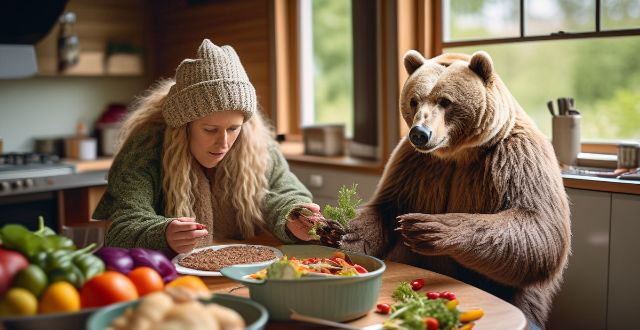Climate change has gender-specific impacts on agriculture and food security. Women often bear the brunt of these impacts due to their roles in household food production and preparation, income generation through small-scale farming, and community leadership in natural resource management. Men, on the other hand, may experience changes in employment patterns, loss of income, increased stress, and social conflicts over resources. Both women and men face challenges such as reduced crop yields, increased workload, loss of traditional knowledge, health risks, and reduced dietary diversity. Addressing these gender-specific impacts requires a comprehensive approach that promotes gender equality and empowers both women and men to adapt to climate change.

Gender-Specific Impacts of Climate Change on Agriculture and Food Security
Climate change is a global phenomenon that affects all aspects of life, including agriculture and food security. However, its impacts are not gender-neutral. Women and men experience climate change differently due to their distinct roles, responsibilities, and access to resources. This article explores the gender-specific impacts of climate change on agriculture and food security.
Introduction
Climate change poses significant challenges to the agricultural sector, which is the backbone of many economies worldwide. The effects of climate change on agriculture include altered growing seasons, increased frequency and intensity of extreme weather events, and changes in water availability. These impacts have far-reaching consequences for food security, particularly for vulnerable populations such as women and children.
Gender Roles in Agriculture
Women's Roles
- Primary caregivers: Women are often responsible for household food production and preparation.
- Income generators: Many women generate income through small-scale farming or selling agricultural products.
- Community leaders: Women play crucial roles in local decision-making processes related to agriculture and natural resource management.
Men's Roles
- Landowners: Men typically own more land than women.
- Labor providers: Men provide most of the labor for large-scale commercial farming operations.
- Policy influencers: Men tend to hold more positions of power in government agencies and non-governmental organizations (NGOs) that shape agricultural policies.
Gender-Specific Impacts of Climate Change on Agriculture
Impacts on Women
- Reduced crop yields: Climate change can lead to reduced crop yields, affecting women's ability to provide for their families and earn an income.
- Increased workload: Extreme weather events may require women to spend more time collecting water and firewood or repairing damaged homes and infrastructure.
- Loss of traditional knowledge: As climate change alters ecosystems, women's knowledge of local plant species and their uses may become less relevant.
- Health risks: Extreme temperatures and changing disease patterns can increase health risks for women, who often lack access to healthcare services.
Impacts on Men
- Changes in employment patterns: As climate change affects agricultural productivity, men may need to seek alternative sources of employment or migrate in search of work.
- Loss of income: Decreased crop yields or failed harvests can lead to financial losses for male farmers.
- Increased stress and mental health issues: Climate change can exacerbate stress levels among men, leading to mental health problems such as depression and anxiety.
- Social conflicts: Competition over scarce resources like water and land can lead to social conflicts between men from different communities.
Gender-Specific Impacts of Climate Change on Food Security
Impacts on Women
- Reduced dietary diversity: As crops fail or become less nutritious due to climate change, women may struggle to provide adequate nutrition for their families.
- Increased food prices: Droughts and floods can drive up food prices, making it harder for women to afford sufficient quantities of food.
- Loss of livelihoods: Women who depend on small-scale farming or fishing may lose their primary source of income if these activities become unsustainable due to climate change.
- Increased vulnerability to violence: Economic hardship caused by climate change can increase women's vulnerability to domestic violence and sexual exploitation.
Impacts on Men
- Food insecurity: Men may face food insecurity if they lose their jobs or income sources due to climate change impacts on agriculture.
- Loss of status and identity: For men whose social status is closely tied to their role as providers, losing the ability to support their families can lead to feelings of shame and frustration.
- Migration pressures: Men may feel compelled to migrate in search of better economic opportunities if local agriculture becomes unviable due to climate change.
- Intergenerational poverty: Climate change can perpetuate cycles of poverty among male-headed households, especially those dependent on agriculture for their livelihoods.
Conclusion
Climate change has profound gender-specific impacts on agriculture and food security. While both women and men are affected, their experiences differ significantly due to cultural norms, socioeconomic factors, and access to resources. Addressing these gender-specific impacts requires a comprehensive approach that considers the unique needs and challenges faced by each gender group. By promoting gender equality and empowering women and men to adapt to climate change, we can build more resilient communities and ensure a sustainable future for all.